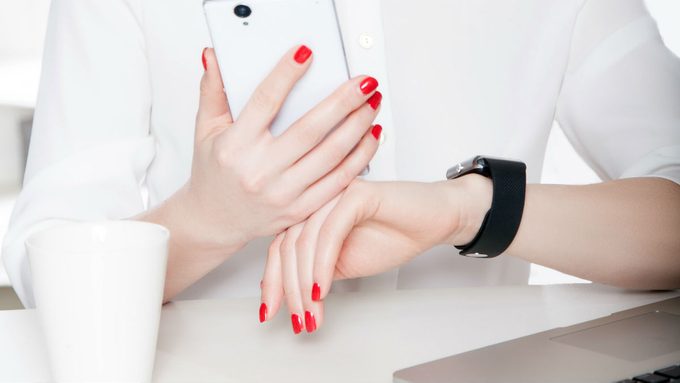Is Technology Shaming You? Or Is It Making You A Better Person?
Technology has its good side – and its bad side. But like anything, moderation is key. Here is how to find balance in this digital age.

Finding balance in how you use technology
Always on your phone? Have you checked how many steps you made today? Did you pin a week’s worth of recipes yet? Perhaps technology is more of a burden than it is a modern tool.
The perception nowadays is that more information is always better and that you can take control of your life with it, says Timothy Caulfield, a Canada Research Chair in Health Law and Policy and a law professor at the School of Public Health at the University of Alberta. “There’s this phenomenon that we’re supposed to be constantly improving,” he says, “and if we’re not striving to improve ourselves, we’re somehow living a slightly less valuable life.”
Does your wearable tech shame you?
Caulfield says he finds himself falling into the trap, too. An avid cyclist, he eventually stripped all the techy gear off his bike – even his speedometer – just so he could relax and enjoy the ride for once. “Unplugging is definitely part of it,” he says. “I really think we have to accept more of a ‘relax’ mentality.”
Caulfield now evaluates every technological intervention to determine whether it will add stress, suck time, be a distraction or cost money. “If it’s going to make my life easier and save time, then I embrace it,” he says. “If it’s not, I don’t.”
With access to pretty much anything online, aren’t we all experts?
We need to start thinking before we auto-click. Sure, it’s cool that you can just look online to learn how to cook rice in your new Instapot without burning your way through three batches, says Dr. Pamela Rutledge, director of the Media Psychology Research Center in Newport Beach, CA.
But feeling like you have to be master of your domain for every little thing is neither productive nor healthy. “Do I feel like I can fix everything in my house? No. Would I look to see if the solution was within my frame of reference? Probably.”
She says that while she isn’t about to rewire her entire electrical system, she might research it just so that she can have a more informed conversation with her electrician. “You have to make adjustments to what you’re willing to do and not willing to do,” she says. “You need to set boundaries and find a way to manage your time in this new world.”
Are our DIY efforts harming our self esteem?
To detox technology or not to detox technology? That is the question
Instead of dropping your devices altogether or taking a “break” from them, she recommends deciding where technology helps and where it hinders you.
“The solution is to go back to basics, not throw out your phone,” says Rutledge. “It means asking ‘What are the important things in my life and how can I use technology to facilitate them?’”
Sometimes it’s just about knowing your limitations
Katrina Onstad, author of The Weekend Effect: The Life-Changing Benefits of Taking Time Off and Challenging the Cult of Overwork, shares a story about her daughter seeing a birdhouse on Pinterest. She wanted to make one just like it.
“It was way beyond me, and it was a disaster,” says Onstad. She felt as though she’d failed herself and her daughter, not to mention the local bird population.
These types of projects can be emotionally exhausting and make you feel as though you’re always falling short if you don’t get everything just right.
“It becomes a way to give you credentials as the perfect mom who can not only hold down a job and raise kids but also build a birdhouse,” she says. “Instead of being a form of rejuvenating leisure, many of the tasks we set for ourselves actually become depleting.”
Onstad says that, at some point, you need to draw a line, and that line will be different for everyone, but draw it you must. “It’s much healthier to find activities that are soothing rather than things that are imposed on you by the impossible standards of womanhood we all seem to be living under now,” she says.
Find out how social media is making us feel more alone than ever.




